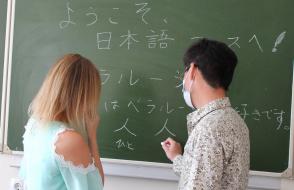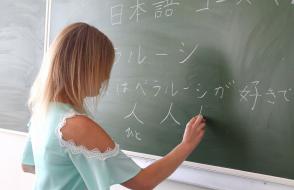Culture is primarily the result of people's activities, their traditions, rituals, experiences and habits. The culture of Western European countries is very different from the culture of Eastern countries. This was influenced by historical events, and certain moral norms, and worldview, as well as religious views. However, interaction with different cultures and countries has a positive impact not only on the development of society as a whole, but also on each individual specifically.
In November at the Francisk Skorina Gomel State University hosted the exhibition "Traditions and Culture of Japan" (https://gsu.by/ru/node/4889 ), which was organized with the support of the Embassy of Japan in the Republic of Belarus, and the direct organizer of the exhibition project was a Japanese citizen Nakanishi Masatoshi, who is currently a teacher of Japanese at the training courses of the "GSU-Profi" Institute of Additional Education. Nakanishi Masatosi shared with us his impressions about the Republic of Belarus, its people, told about his country, as well as about the prospects for personal growth and the implementation of joint interstate projects.
- Masatosi, please tell us about how you came to the Republic of Belarus and about your impressions of our country.
-I have been living and working in the Republic of Belarus for a long time; during the year I studied Russian at the training courses "GSU-Profi". Russian is a very difficult language for me, but I want to know and understand it. Belarus is a very beautiful country with its unique nature and customs. But most of all I like her people - they are very kind, open and, one can say, the character of Belarusians is very similar to the character of the Japanese.
– What kind of education do you have and what did you do in your homeland?
– In Japan, I graduated from the Faculty of Law and worked for about 20 years as an economist-lawyer in a private organization in Tokyo.
- Tell us more about the organization of the exhibition "Traditions and Culture of Japan" at our university.
– This exhibition is being held in Gomel for the third time. The first time it was organized in the Regional Center of Culture of the city of Gomel, and the other two - in the Francisk Skorina Gomel State University All exhibition projects were supported by the Embassy of Japan in the Republic of Belarus, which allocated an official grant for holding national events in your country. It can be argued that this is the first purposeful step for the interaction of the two states. My dream is to invite investors from Japan, and then, perhaps, invest in educational projects in Belarus.
– Currently, you are teaching at the training courses of "GSU-Profi" Institute of Additional Education. What can you tell us about the peculiarities of learning Japanese? What difficulties do students face?
– I started teaching Japanese at the GSU-Profi training courses two years ago. It is worth noting that learning any foreign language requires patience, perseverance and motivation from students. The grammar of the Japanese language is very different from the grammar of the Russian language, but it is not too difficult to understand. But the system of Japanese writing may seem extremely complicated, since the Japanese use three types of writing. In order to begin to understand and speak Japanese, 1-2 years of studying it is enough, but it all depends on the individual abilities of a person. Some of my students already speak Japanese and have come to the courses for in-depth study of the language in order to further its application in the professional sphere.
- Tell us about your family. We know that your spouse is a citizen of Belarus. I wonder how your family reacted to your choice.
- Yes, my wife is from Gomel. Three years ago we got married in Belarus and celebrated our wedding in Gomel. My parents warmly and cordially welcomed my wife and supported me. The differences between Belarusian and Japanese cultures make our family relations unique. I really like Belarusian culture and especially Belarusian cuisine. During my stay in Belarus, I tried many national dishes, but most of all I liked the solyanka and draniki prepared by my wife. And for my wife, I cook national Japanese dishes (sushi, miso soup, tempura, sukiyaki). I have an idea to organize an event at the university dedicated to traditional national Japanese dishes, which can be held as part of the Japanese Spring project.
- Thank you, Masatosi, for very useful and new information for us. We wish you professional growth and development, as well as the implementation of your projects!
Press Secretary of the Institute of Additional Education
N. Azjavchikova

















